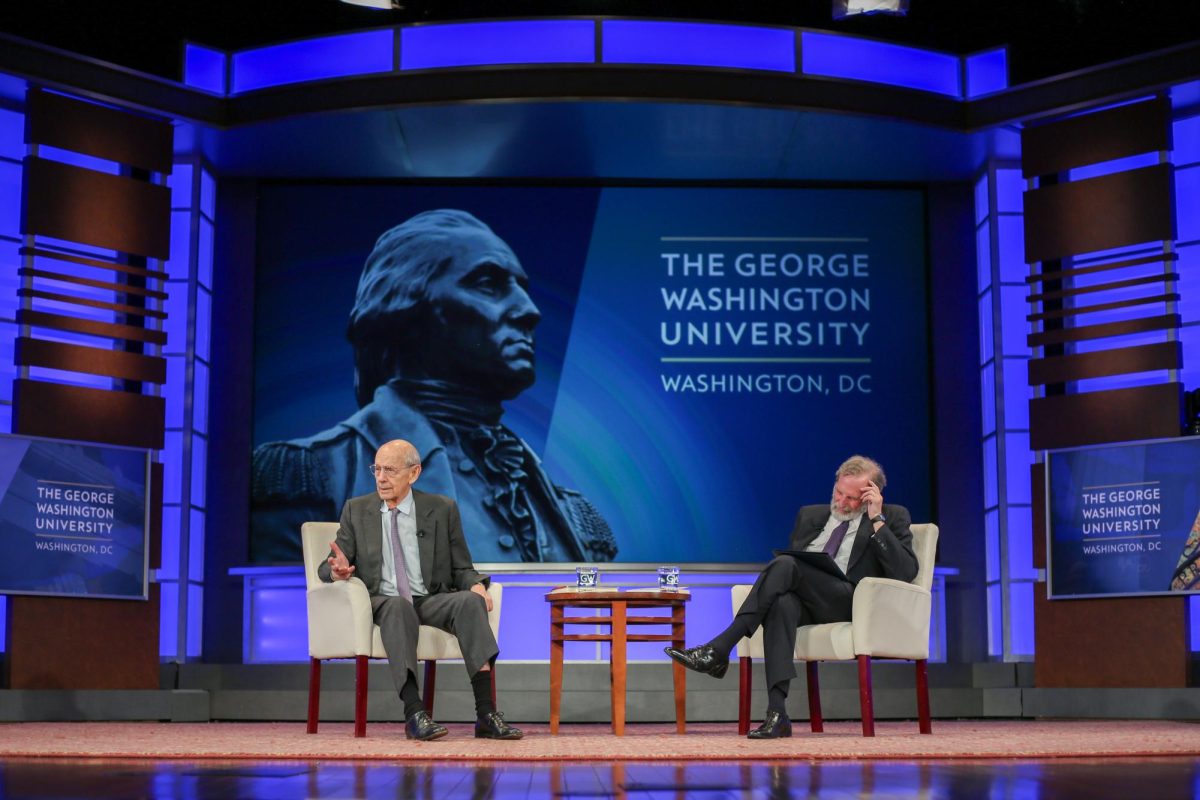Former United States Supreme Court Justice Stephen Breyer discussed his time on the Court and his new book in the Jack Morton Auditorium on Monday.
Breyer spoke about the “stark fear” he felt during his first year on the Court while adjusting to the role and his surprise to see how each justice worked on their own. The event, hosted by the GW Law and moderated by Associate Dean for Public Interest and Public Service Alan Morrison, was the final installment of a five-part conversation series about Breyer’s career and legacy.
President Bill Clinton appointed Breyer to the Court in 1994, who served for 28 years until his retirement in 2022. Serving on the bench for notable cases like Bush v. Gore and Citizens United v. Federal Election Commission, Breyer was among the more liberal justices on the Court known for his pragmatic approach to interpreting the Constitution.
“Anyone who is appointed to the Supreme Court knows that lightning has to strike twice in the same place before you are appointed to the Federal Supreme Court,” Breyer said. “You thought you could do the job, you thought so and then you’re there and you wonder inside, ‘Can I really?’”
Breyer said he used certain criteria to determine if the Court should take up a case, like whether or not lower courts differed on the interpretation of the law or constitution, if a lower court declared a law unconstitutional or if he believed there should be a Supreme Court case on a particular issue. Breyer said his process of determining his vote on whether the Court should take a case had gotten more strict over time.
“I was more generous at the beginning because there would be things that I would take, perhaps rightly, but I didn’t know anything about,” Breyer said.
Breyer said he approached oral arguments on the Court with an “open mind,” changing his opinion on a case as he would read through briefs with differing perspectives. He said he would often think he knew his stance on the case at hand before reading an opposing brief, which would cause him to question his vote.
“Being open-minded is not to have a blank mind, it is to be willing to change,” Breyer said.
Breyer said he saw oral arguments as a chance to ask questions that he doesn’t know the answer to and an opportunity to signal how he leaned on a particular case to other justices. He said it is “not often” that oral arguments change his opinion about a case but instead change how he views it, which matters when writing opinions.
“The oral argument is not about you, the judge. It’s not,” Breyer said. “It is something carved out of time and space, something that maybe gets a little progress going.”
Breyer said he wrote his new book, “Reading the Constitution: Why I Chose Pragmatism, Not Textualism,” about his personal experiences on the Court instead of writing about legal theories. He said he took the opportunity to reflect on his time as a justice and reflect on what he has learned from it.
“I can talk some of the theories of textualism and originalism and so forth-ism, but I know there are 100 or 200 or 300 law professors that if you really go into the theory of it, they know more about it than I do,” Breyer said. “But I’ve had some experiences that they haven’t had and so what I want to do is write the book out of that experience.”
Breyer said he doesn’t see politics influencing the Supreme Court like it did when he worked in Sen. Edward “Ted” Kennedy’s (D-MA) office, but he said he does notice ideology and political considerations when justices make decisions.
“It’s a big country, 320 million people, they all think different things and they’ve got to live together,” Breyer said. “And having people who think different things in that kind of way, how you grew up and where you came from, and so forth and so on, that isn’t such a terrible thing.”
Breyer ended the conversation by offering advice to the graduating law school students in attendance, saying they will be practicing law at a “difficult time” for the country, and sharing advice given to him by Kennedy to talk to those you disagree with.
“He said, ‘Talk to people who disagree with you, not the people who agree with you,’” Breyer said. “Kennedy added one thing, don’t talk too much, listen to what they say and you will discover if you listen to what they say, they’ll say something, finally, you agree with.”





